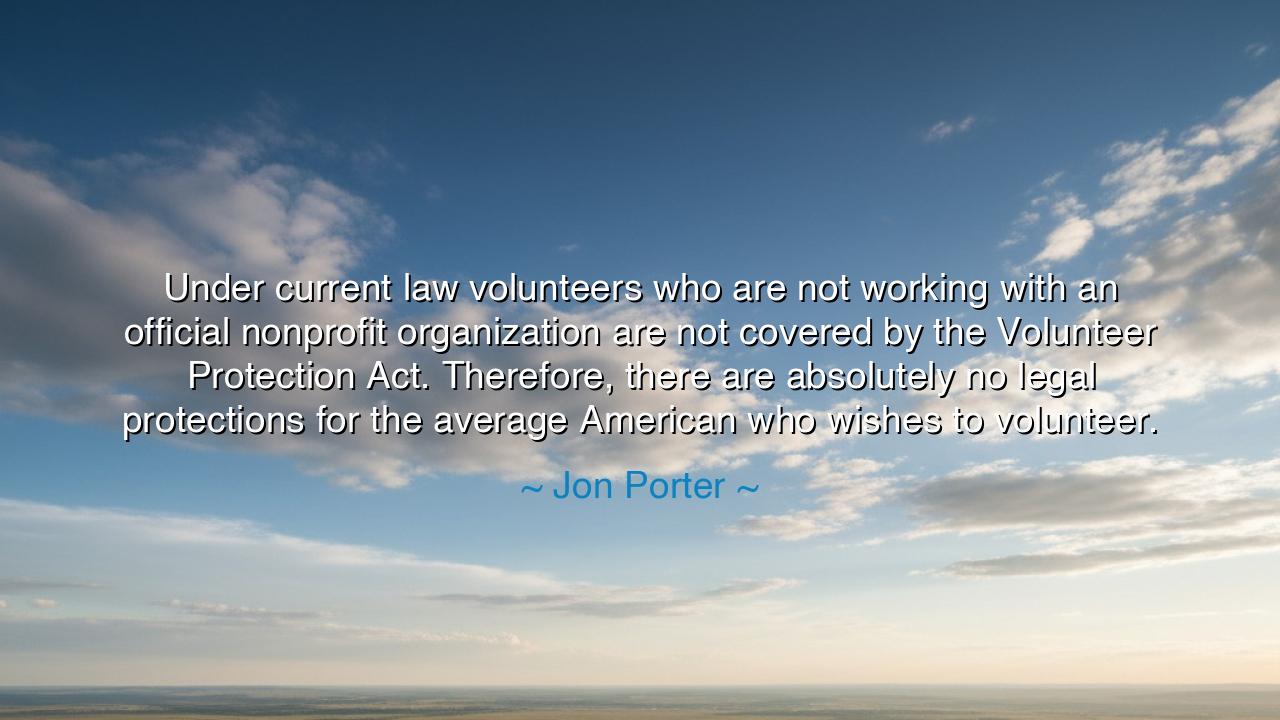
Under current law volunteers who are not working with an official
Under current law volunteers who are not working with an official nonprofit organization are not covered by the Volunteer Protection Act. Therefore, there are absolutely no legal protections for the average American who wishes to volunteer.






When Jon Porter declared, “Under current law volunteers who are not working with an official nonprofit organization are not covered by the Volunteer Protection Act. Therefore, there are absolutely no legal protections for the average American who wishes to volunteer,” he was not speaking as a mere legislator, but as a voice for the spirit of service itself. His words carry the tone of lament and warning — a recognition that even noble acts can be left defenseless in the labyrinth of law. In this statement, Porter reveals the paradox of a society that celebrates generosity, yet leaves its volunteers, the quiet pillars of compassion, vulnerable to the very systems they strive to strengthen.
The origin of this quote lies in the late 20th and early 21st centuries, when the United States sought to encourage civic engagement through laws like the Volunteer Protection Act of 1997. This legislation was meant to shield those who serve their communities — tutors, caregivers, rescuers, and mentors — from personal liability when acting in good faith. Yet, as Porter noted, the law drew a sharp boundary: it protected only those working under the banner of official nonprofit organizations. Those who acted from the pure impulse of the heart, independent of any institution, found themselves outside the law’s shelter. Thus, Porter’s statement arose not from abstract theory, but from a deep concern that law, in its rigidity, had failed to recognize the full breadth of human goodness.
In these words, Porter points to a profound truth that echoes through the ages: that virtue, though divine in origin, must still be guarded by human hands. The ancients knew this well. In the days of Solon, the Athenian lawgiver, even the most righteous citizen required protection under law to perform his duties without fear. A city may honor its heroes, but without clear statutes, their deeds can lead to ruin. So too, in Porter’s time, the modern volunteer — the one who cleans a riverbank, aids a neighbor, or shields a stranger from harm — risked standing alone against the burdens of liability. His statement is thus both a rebuke and a reminder: that good intentions, if not defended by justice, can wither under the weight of uncertainty.
Consider the story of Clara Barton, founder of the American Red Cross. Before the organization gained official recognition, Barton risked her life and reputation during the Civil War to bring relief to soldiers on the battlefield. She was neither sanctioned nor protected by any government or law; she followed only the call of conscience. Had she lived in Porter’s time, she might have stood among those “average Americans” whom the law forgot. And yet, history vindicated her — for the institutions that would later bear her name arose precisely because individuals like her acted beyond bureaucracy, proving that the soul’s compassion precedes legal definition.
Porter’s words remind us that the law, though powerful, is not infallible. It must evolve to meet the moral maturity of a people. To serve others without recognition or reward is among the highest expressions of humanity, yet to do so under the threat of punishment or litigation discourages the very spirit of service that binds communities together. Porter’s appeal, therefore, was not merely political but moral: that a nation should protect its helpers, not constrain them; that justice should not only punish wrongdoing, but safeguard goodness in action.
There is also within his statement an ancient lesson about balance — the eternal tension between order and compassion. A society without law falls into chaos, yet a society whose laws fail to protect the righteous risks decay of the soul. True governance, as the philosophers taught, must mirror the natural order: firm enough to maintain harmony, yet flexible enough to nurture life. Porter’s concern reveals how fragile that harmony can be when laws lag behind the conscience of the people.
Let every listener, then, take this as a timeless charge: do not let fear of imperfection silence your will to serve. Even if the law offers no protection, the universe itself remembers those who give of themselves freely. Yet, also strive — as Porter urged — to make your communities and governments more just, so that kindness may stand without peril. For the strength of a nation is not measured by its armies or wealth, but by how it treats those who act from selflessness, expecting nothing in return.
And so, the teaching endures: protect those who protect others, and build laws that honor the quiet hero. For when the volunteer is safe, the spirit of humanity thrives; and when the selfless are guarded by justice, the heart of civilization itself beats stronger.






AAdministratorAdministrator
Welcome, honored guests. Please leave a comment, we will respond soon